
Nokia to Delist from Euronext Paris, Focus on Core Markets After Strategic Shift
Want to read in a language you're more familiar with?
HELSINKI, Nov. 4 - Nokia's Board of Directors has announced its decision to apply for the delisting of its shares from the regulated market of Euronext Paris. T...
HELSINKI, Nov. 4 - Nokia's Board of Directors has announced its decision to apply for the delisting of its shares from the regulated market of Euronext Paris. The shares were initially listed in Paris in November 2015.
This move follows a comprehensive review of the trading volume, costs, and administrative requirements associated with the Paris listing. Nokia's primary listing will remain on Nasdaq Helsinki, and its American Depositary Receipts (ADRs) will continue to be traded on the New York Stock Exchange. The delisting is subject to approval by the Euronext Board of Directors and is expected to take effect within the next three months.
This decision underscores Nokia's evolution from its past identity as a mobile phone leader to a focused business-to-business technology powerhouse. Since selling its mobile handset business in 2014, the Finnish company has successfully pivoted to specializing in network infrastructure, including optical networking, IP routing, 5G equipment, and cloud and network services.
The company's strategic repositioning is yielding positive results, with a 31.58% year-on-year surge in net profit reported for the first half of 2025. Its extensive patent portfolio, spanning 2G to 5G technologies, continues to generate nearly €500 million in stable annual revenue.
In a significant endorsement of its future direction, Nokia recently entered a strategic partnership with NVIDIA, which includes a $1 billion equity investment. The collaboration aims to accelerate innovation in AI-native mobile networks and the transition from 5G to 6G, further solidifying Nokia's role in shaping the next generation of telecommunications infrastructure.





